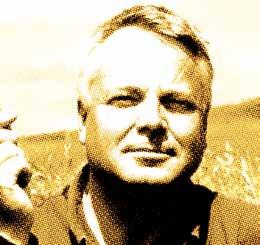
15 minute read
Philosophy Goes Popular
By Clay Jenkinson
In one of his stories, a closet drama called “God, A Play,” Woody Allen has a character turn to the audience and ask, “Did anybody out there major in philosophy?” Nobody responds except Doris, “who majored in gym, with a philosophy minor.”
Advertisement
That’s me.
I won’t quite go as far as Dr. Samuel Johnson’s old friend Oliver Edwards, who, in meeting the great but deeply pessimistic lexicographer in later life, said, “I have tried, too, in my time to be a philosopher; but I don’t know how, cheerfulness kept breaking through.” I know my temperament is not a philosophical one.
I have come at life more as a philosophe than as a philosopher. I am pretty sure I do not have sufficient rigor of mind or commitment to ratiocination to be a serious student of philosophy, much less call myself a philosopher. There are many cultural categories I cannot in good conscience place myself in: poet, artist, musician, dancer, broncobuster, and slam-dunker, among others. And then there’s philosopher. I don’t know which is more forbidding, Plato, whom I have read, taught, and whose Greek I struggled to parse, or Wittgenstein, who was all the rage during my years of graduate study abroad, whose work I know only in the shallowest way, from biographies of the great philosopher and philosophe Bertrand Russell.
The philosophes were public intellectuals of the Enlightenment. Few were formal philosophers. Voltaire, Diderot, and America’s Thomas Jefferson were reformers, encyclopediasts, philanthropists, and philosophical essayists who applied reason and skepticism to the study of philosophy, history, science, politics, economics and social institutions. As their hero Francis Bacon put it much earlier, they took all knowledge to be their province. Fueled by the new fashionable drug caffeine, meeting in chocolate and coffee houses, or, like Johnson, “drinking tea in oceans,” they turned their busy, buzzing minds in every direction, reviewing, revising, reforming everything they could get their hands on, and reclaiming the classical inheritance.
With that said, I’m pretty uncomfortable identifying myself even as a poor postmodern philosophe, but no part of me could ever make the claim that I was a philosopher or really even a serious student of philosophy, so what else do I have? I have read a good deal of philosophy in the course of my life, but in a loose, unsystematic way, and—as they say— cheerfulness kept breaking through. What follows, therefore, is the work of the least able contributor to this issue of On Second Thought.
The great question I face is: how does one get a modest useable education in philosophy without actually facing the great texts of philosophy head on? Is there a relatively painless way to absorb some philosophical concepts and controversies without giving one’s life to it, without losing one’s cheerfulness?
I remember reading straight through Bertrand Russell’s The History of Western Philosophy many years ago, and feeling pretty smug knowing that I had persevered through a book that, like all surveys and encyclopedias, gives attention to many things that I don’t find interesting, but which may be centrally important to someone (or everyone) else. Then I was chagrinned to read, in Ronald W. Clark’s biography of Russell, that the publishers who commissioned the book were disappointed with it, and that Russell’s fellow philosophers found much to quibble with in his survey of western philosophy. Still, as far as I’m concerned, Russell’s History remains the best and most painless way in to the world of philosophy for the non-professional. Among other things, Russell’s prose is always lucid and quite often witty. It is always a joy to experience the clarity of extreme intelligence.
There is also Frederick C. Copleston’s nine-volume History of Philosophy, which is probably more reliable because it has less of Russell’s wonderfully opinionated personality in it, but it is also, to my mind, much less compelling to read. I own and frequently consult W.T. Jones’ and Robert Fogelin’s five-volume History of Western Philosophy. I’m enormously fond of Jaroslav Pelikan’s The Christian Tradition: A History of the Development of Doctrine in five volumes. And if you are really out of time and energy, there is Will and Ariel Durant’s The Story of Philosophy: The Lives and Opinions of the World’s Greatest Philosophers.
Those are the texts that have been available to the amateur and the dilettante all of my life. But more recently, beginning in 1999, there has appeared a very large, very interesting, and very agreeable alternative.
I cannot remember just when I first picked up some title in the “Popular Culture and Philosophy,” series, but it was at a Barnes & Noble bookstore in Reno, Nevada, and I know I was searching for something else. Walking past “philosophy” in quest of “religion” I saw the title—I am no longer sure which—and I did a literal double take. I remember thinking, “This is an ingenious idea. I wonder if it really works?” I think it might have been volume 10, Mel Gibson’s Passion and Philosophy: The Cross, the Questions, the Controversy.
The “Popular Culture and Philosophy” series had an accidental beginning. William Irwin, an assistant professor of philosophy at King’s College in Pennsylvania, decided to write a book about the philosophical underpinnings of the NBC sitcom Seinfeld. The success of his Seinfeld excursus led him to collaborate with others on The Simpsons and Philosophy, and The Matrix and Philosophy. In this ad hoc way, a significant publishing phenomenon was born. By now more than 25 “Popular Culture and Philosophy” titles have been published, including studies of philosophy and U2, Poker, Monty Python, Hip Hop, Harley-Davidson, and even Facebook and the Atkins Diet. The books are collections of related essays, all ostensibly driven by philosophical concerns.
So far the best seller of the series has been The Simpsons and Philosophy, which has sold more than a quarter of a million copies. Aeon Skoble, one of its co-editors and also the editor of the volume on Woody Allen, has been quoted as saying, “Students are reading them and getting excited about philosophy, and we even find some professors working bits of them into classes. I’ve had total strangers email to tell me they’ve changed their major to philosophy as a result of these books.”
According to Skoble, “The aim isn’t to dumb down philosophy, nor to equate every pop culture artifact with Shakespeare or Sophocles. Rather, we intend the books to foster greater interest in philosophy, and to be an interesting way to explore certain topics.”
Assuming that their audience is the same as the audience of On Second Thought, i.e. well-educated non-specialists, the books in this series only work if they accomplish one of two things. Either they must use popular culture as a window on philosophy or they must use philosophy as a lens by which better to understand some construct of popular culture: Baseball, the television show House, or Facebook. The very best of them, I’m happy to report, do both. If the series is an attempt to lure well-enough-educated but philosophy-intimidated readers into exploring philosophy because of the promised entertainment value, it has certainly worked for me. I’m guessing that it has worked for tens of thousands of others, too.
In an essay on the nature of Woody Allen’s humor in Woody Allen and Philosophy: (You Mean My Whole Fallacy Is Wrong?), Lou Ascione unintentionally provides a defense for this entire series of books. “Humor,” he writes, “can be used to present philosophical ideas and/or to raise important questions that many people would simply reject outright because they are not part of accepted culture. Some important philosophical ideas and questions are superficially unattractive to the general public, and therefore are unlikely to even be considered for intelligent reflection if presented in a non-humorous context.” Precisely. People who might not wish to explore Kierkegaard’s theories of self-actualization head-on, might find those same theories acceptable, even extremely useful, if they are presented by way of illuminating the character strategies of Seinfeld. That, at least, is the theory. How well does it work in practice?

Clay Jenkinson

Clay Jenkinson

Clay Jenkinson
To prepare for this essay, I have read the bulk of half a dozen of the titles in this series. I confess that my acquaintance with popular culture is spotty and haphazard. I am not one of those folks who have adopted a favorite popular television series, and argue for its significance in the face of good sense, not to mention the derisive skepticism of their friends. I doubt that I have seen the majority of episodes of any television series in history with the possible exception of the original Star Trek (1966-69), which I have watched principally for that moment when the native princess in the cellophane bikini asks Kirk to show her what this thing “you call kiss” is, and then betrays not just her civilization but her whole planet the morning after. I have read many but not all of the essays in the philosophy volumes on Mel Gibson’s Passion, the Beatles, Woody Allen, The Simpsons, Monk, and House. And, most recently, Seinfeld and Philosophy: A book about Everything and Nothing, the first book in the series. I chose to read these titles because I have a particular interest— thanks to my 15-year-old daughter—in Monk and House, because I have read all of Woody Allen’s essays at one time or another, because I’m fascinated by Passion Plays of every sort, and because Abbey Road and the White Album were the two musical texts of my late adolescence. I read The Simpsons and Popular Philosophy because it’s the blockbuster of the series, though I have not seen more than a handful of Simpsons episodes. I now intend to buy the series on DVD and watch some of it, too.
I find the Popular Culture and Philosophy series both useful and extremely entertaining. I have in the past few days read definitions—shortened, simplified, but earnestly developed—of postmodernism, Marxism, deconstruction, poststructuralism, existentialism, the nature of the sublime, classicism, romanticism, nihilism, and transcendentalism, among others. I’m sure that a properly full philosophy professor would likely look up over the top of the book in question to say, “Well, of course, it’s a lot more complicated than that, but I suppose this works well enough as a popular introduction, though I’d quibble with the phrase….” But in no case have I felt that one of these proffered definitions was erroneous or misleading.
One of the best things about this series is that it is written for general readers, not specialists and professional philosophers. Because of that, there has to be some check on jargon and what might be called “insider discourse.” Some of the essayists fail to remember this and the result—one assumes—is that their contributions to the books go unread. Another advantage of this genre is that the authors feel compelled to explain things that would simply be taken for granted in professional discourse. Thus, in The Simpsons and Philosophy: The D’oh! of Homer, Dale E. Snow and James J. Snow provide a superb definition of parody: “Parody (at its best) reveals to us an aspect of something heretofore not seen or appreciated. It jars us from our complacencies by showing us where a convention or idea may end up if unfettered by other ideas or conventions.” In professional discourse no re-definition of parody would be provided because, presumably, none would be required.
Samuel Johnson said, “men more frequently require to be reminded than informed.” This is equally true for the writer and the reader. A return to definitions and first principles is an essential exercise in staying in intellectual shape. That’s one reason that some of the ablest senior professors in elite universities elect to teach introductory courses, while many entry-level and mid-level academics make the mistake of disdaining the teaching of fundamentals. Almost any person who regards her or himself as well-educated, benefits from continual returns to the basic foundation and vocabulary of their knowledge base.
For me, the books in this series are at their best when they serve as explorations of the popular culture in question, with just enough philosophy to make that a more satisfying and insightful project. In reading these essays I discovered that once I surrendered to the concept of taking pop culture seriously as a text or work, I became fascinated by what might be called the humanities possibilities of something I have, like everyone else, merely ingested in the passive way of a media consumer.
There are, of course, significant weaknesses in this series of books. For example, they are spotty. There is no attempt— within a single volume or in the course of the series—to provide a comprehensive survey of western philosophy. (If you want that, you are going to have to consult Russell, et al.)
Furthermore, because these books are compilations of essays by a large number of writers and not controlled by a single interpretive intelligence, they are inevitably mixed bags. Some essayists have surrendered to the essential waggishness of the concept better than others. In any collection of essays by various hands, whether focused on pop or high culture, some contributions are inevitably more thoughtful, more insightful, and better written than others.
Moreover, some types of pop culture lend themselves to this sort of philosophy-lite treatment better than others, and some pop culture lends itself to philosophical extrusion better than others. In an ironic way, The Simpsons makes for better material than the Beatles, in part because The Simpsons has a well-established story line with a continuity of prolonged and remarkably consistent fictional characterization, while the Beatles wrote approximately 250 songs, each essentially a discrete text. Even the albums that might be said to have an overarching thematic integrity— Sargent Pepper, Abbey Road, the White Album—remain, in some essential sense, ad hoc collections of songs.
I find cultural commentary compelling, because I am interested in and I desire to understand the world I live in, which is not the world of John Henry Cardinal Newman. I am interested in his world too, but I am a little lonely in that world and not at all lonely (for cultural conversation) in mine.
Let’s face it. Milton’s Paradise Lost is read by a few hundred thousand people per year, Chaucer’s Troilus and Criseyde by a few thousand or perhaps merely a few hundred. Seinfeld has tens of millions of viewers, many of whom know Seinfeld much better than I know John Donne or Lewis and Clark. Literally millions of people know the plots, characters, texts and subtexts of Seinfeld, and use scenes from the sitcom as one of their primary cultural reference points. There are hundreds of thousands of people who can quote whole scenes from the sitcom the way an elocutionist quotes Shakespeare. It is not at all uncommon to hear someone—even a learned lecturer—saying to a public, “Do you remember that episode of Seinfeld in which the Soup Nazi…?” or “Do you remember the time the reporter concludes that Jerry and George are gay, not that there is anything wrong with that?” One rarely hears people saying, “Do you remember when Milton likens Satan’s shield to the moon as seen through Galileo’s optic glass?” It might just be possible to do a book in this series called Jane Austen and Philosophy but it would be ruinous—from a financial perspective—to publish one called Dickens and Philosophy, or Dostoevsky and Philosophy (even though I would instantly pre-order both) because there is not enough common culture there (any longer) to gather a readership. And yet, 100 years ago Dickens and Philosophy would have been a very hot literary commodity.
Two things about this series really impress me. First, I like it that serious intellectuals wish to communicate with the general public. At a time when the dialogue between the academy and the off-campus world is so dysfunctional that it threatens to inspire the forces of reaction to question the need to fund universities at taxpayer expense, these books take seriously the mission of academic outreach. At a time when some of the jargon of the cultural studies movement is bandied about rather loosely in and out of the academy, by people with little or any real understanding of such terms, these books give smart, but not “current” people a chance to come to terms with the cultural vocabulary of our times without wading through Derrida or even Terry Eagleton. These books cannot compete in the marketplace unless they speak to the public in what Wordsworth called “a language really used by men.” In doing so, they perform a vital Jeffersonian service to our culture. Second, I like it that these intellectuals regard Star Wars and the Matrix and the Sopranos as texts worthy of serious explication and interpretation.
It’s not that every lover of Buffy the Vampire Killer or Mel Gibson’s Passion will turn to these books. Probably most admirers of this series are people like me, curious to see what can be said philosophically about the Atkins diet or The Wizard of Oz; people who would like to get more serious about philosophy but for whatever reason are not likely to start by way of the Tractatus or Heidegger’s Being and Time; people who understand that popular culture is serious business even when it is vapid, people who want to explore the cultural world as it actually plays itself out in the 21st century, rather than live in loneliness on the shrinking island of the canon.
Because we live in a world where most of the cultural action is now in media, it is important that we teach young people to “read” those texts as creatively and rigorously as we once tried to teach them to read King Lear. It’s no longer a question of relevance. It is now a question of survival—the survival of the academy, the survival of Jeffersonian civic engagement, and the survival of our increasingly (and militantly) philistine culture.
Clay Jenkinson is the Director of the Dakota Institute in Bismarck, North Dakota. He is the author of six books and has just completed his second documentary film, The Charisma of Competence: The Achievement of William L. Guy.
— Jean-Paul Sartre










